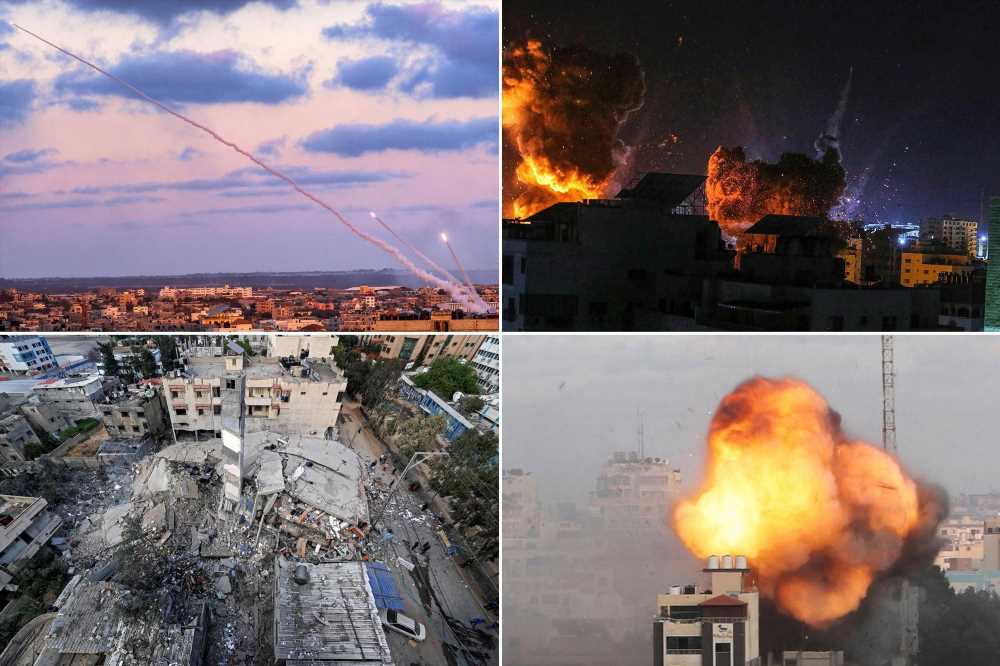More On:
israel
Sen. Cotton asks if AP reporters let Hamas use them as ‘human shields’
If AP really didn’t know it shared space with Hamas, why trust its reporting?
Biden approves $735M arms sale to Israel as calls for ceasefire grow
Letters to the Editor — May 18, 2021
Israeli aircraft carried out a new wave of airstrikes against targets in the Gaza Strip on Tuesday as militants fired rockets at the Jewish state, targeting its northern border with the projectile and a drone, which the military said may have been launched from a neighboring country.
The Israeli strikes leveled a six-story building that housed libraries and educational centers belonging to the Islamic University, leaving behind a massive mound of debris.
There were no reports of casualties after the Israel Defense Forces warned the building’s residents ahead of time, sending them fleeing into the predawn darkness.
“The whole street started running, then destruction, an earthquake,” said Jamal Herzallah, a resident of the area. “This whole area was shaking.”
The latest round of hostilities came as general strikes were held Tuesday in East Jerusalem, Arab towns within Israel and in the Israeli-occupied West Bank, with posts on social media urging solidarity “from the sea to the river,” according to Reuters.
Brig. Gen. Hidai Zilberman, the IDF’s chief spokesman, said the military was continuing to operate in Gaza in accordance with a target list for the next 24 hours.
“The IDF is not talking about a ceasefire. We’re focused on the firing,” he told Army Radio, Haaretz reported.
Meanwhile, Israel also came under attack along its border with Lebanon, from where six rockets were fired but apparently fell short of the border, The Times of Israel reported.
The IDF, which ordered several communities within 2.5 miles of the border to open bomb shelters, responded with artillery fire. No injuries were reported.
A Lebanese military source confirmed to Agence France-Presse that several Grad-type rockets had been fired from the Shebaa Farms area in southern Lebanon.
Zilberman said the IDF believes a small Palestinian faction — not the Hezbollah terror group — was responsible for the attack.
The United Nations peacekeeping force in the area, UNIFIL, said Tuesday that the border was now calm.
“UNIFIL detected firing of rockets from the general area of Rashaya Al Foukhar north of Kfar Chouba in S. Lebanon,” UNIFIL said in a tweet.
In another incident, Israeli forces shot down a drone approaching the country from Jordan early Tuesday, in what appeared to be the seventh such attack since the beginning of hostilities between Israel and Hamas on May 10.
“Earlier this morning, a drone approaching the Israeli border in the Emek HaMaayanot area was intercepted after being monitored by the Israeli Air Force. The drone fragments were collected by security forces,” the IDF said in a statement, according to Haaretz.
The IDF said it examining the origins of the drone, and whether it came from Syria or Jordan, according to the news outlet.
The military has reported several drone launches by Hamas during the latest the fighting, including an explosives-laden one that was downed by the IDF — and “fell on the launch squad” in the Gaza Strip on Saturday, killing two militants.
At least 212 Palestinians have been killed during more than a week of Israeli airstrikes, including 61 children and 36 women, with more than 1,400 people wounded, according to the Gaza Health Ministry.
On the Israeli said, nine civilians, including a 5-year-old boy, and a soldier have been killed.
In the past 12 hours, 90 rockets were launched from Gaza at Israel, according to the IDF. Twenty of those failed to make it across the border.
The IDF said it continued attacking Hamas targets overnight, including the homes of the terror group’s commanders and five headquarters. It also carried out 65 strikes on militant tunnels throughout the Gaza Strip.
In addition, at least 150 Hamas and Islamic Jihad commanders have been killed since the conflict erupted last week, the military said.
The Israeli aircraft carried out the strikes as the militants in Gaza appeared to temporarily pause the rockets attacks until alarms sounded in the town of Netivot, The Times of Israel reported. There were no immediate reports of casualties.
Hamas said the attack on the community was in response to “Zionist aggression,” an apparent reference to the overnight strikes.
Zilberman said the IDF did not know the reason behind the lull in rocket fire, but was continuing with its campaign against Hamas and the Palestinian Islamic Jihad.
He said the overnight strike was the fourth in a series of bombardments on Hamas’ underground tunnel network, which the IDF dubbed “the Metro.”
The attack destroyed about nine miles of underground tunnels in Gaza City and Khan Younis, Zilberman said. About 62 miles of tunnels had already been bombed in the previous three raids, IDF spokesman Lt. Col. Jonathan Conricus said Monday.
Tuesday’s airstrike was conducted with some 60 jets, dropping over 100 bombs on about 65 targets over roughly 30 minutes, according to Zilberman.
He said the purpose of all the strikes was to convince Hamas and its operatives that its subterranean infrastructure was no longer safe and cannot be trusted, the news outlet reported.
Zilberman added that the IDF also targeted several underground multi-barreled rocket launchers, destroying at least 10, including six that were aimed at the Tel Aviv area.
In another development Tuesday, the UN welcomed an Israeli decision to open the Kerem Shalom crossing to allow aid into Gaza, and urged the opening of a second location to allow humanitarian workers inside, AFP reported.
“We very much welcome the Israeli authorities’ opening of Kerem Shalom crossing for essential humanitarian supplies,” Jens Laerke, a spokesman for the UN humanitarian agency OCHA, told reporters in Geneva.
With Post wires
Share this article:
Source: Read Full Article



















